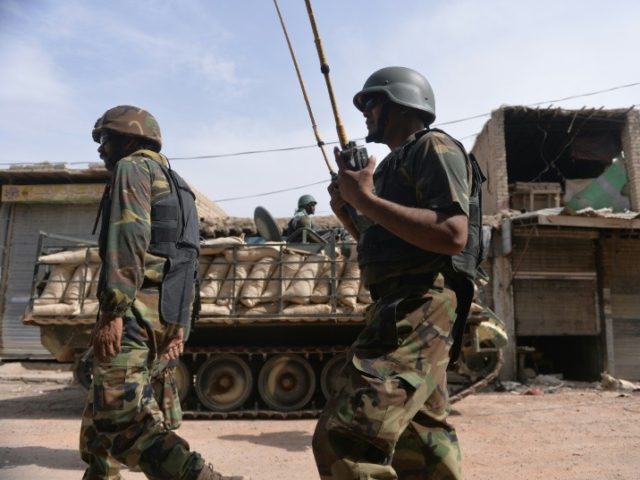Pakistan is deploying an undetermined number of additional forces to join up to 800 of their counterparts in allied nation Saudi Arabia, one of the top financial contributors to Islamabad’s growing nuclear program.
The Pakistani troops are only expected to engage in a “training and [advisory] mission,” not combat operations, notes a statement from the Pakistani military, according to Reuters.
Although Reuters acknowledges that the specific role of the Pakistani troops remains “unclear,” Islamabad’s military asserted its forces would “not be employed outside” Saudi Arabia.
Retired Brigadier Shaukat Qadir, a Pakistani military analyst, indicated to Reuters that Islamabad has been considering sending troops to Saudi Arabia for some time, adding, “Now, apparently, for whatever reason, the decision has been taken.”
Pakistan has lost about $2 billion in security aid suspended by the United States over its refusal to take “decisive action” against terrorist groups planning attacks from Pakistani soil against U.S. troops and its allies in neighboring Afghanistan.
Pakistan may be seeking new allies who can provide financial assistance, to replenish the funds it has lost from the United States.
The Trump administration has made it clear that it is willing to unfreeze the security assistance to Islamabad if it starts to combat the terrorist groups who have found sanctuary on Pakistani territory, but so far the Muslim-majority country has been reluctant to do so.
It remains unclear whether or not the new Pakistani troops will participate in operations with the 750 to 800 non-combat Pakistani troops who are already in the Sunni kingdom.
“Saudi Arabia had asked fellow Sunni-majority Pakistan to provide ships, aircraft, and troops for the Yemen campaign to stem the influence of Shi’ite Iran in what appears to be a proxy war between the Gulf’s two dominant powers,” reports Reuters.
For years, the Saudi kingdom has awarded financial aid to Pakistan’s defense sector, particularly its missile and nuclear labs, believing that the assistance will allow the kingdom to acquire nukes at will, BBC noted in 2013.
Citing NATO, BBC noted that intelligence reports mention that “nuclear weapons made in Pakistan on behalf of Saudi Arabia are now sitting ready for delivery.”
If Iran gets a nuclear bomb, “the Saudis will not wait one month. They already paid for the bomb, they will go to Pakistan and bring what they need to bring,” Amos Yadlin, a former head of Israeli military intelligence, told BBC.
“What did we think the Saudis were giving us all that money for? It wasn’t charity,” one senior Pakistani official rhetorically asked when talking to Reuters on condition of anonymity, confirming a possible deal between the two countries.
“The Pakistanis certainly maintain a certain number of warheads on the basis that if the Saudis were to ask for them at any given time they would immediately be transferred,” a different unnamed Pakistani told Reuters.
China, Pakistan’s top weapons provider and the third-largest supplier in the world, has helped Islamabad develop its nukes program, providing designs for the missiles and nuclear warheads.
Beijing has also quietly sold missiles to Saudi Arabia.
According to the U.S.-China Economic and Security Review Commission, China continues to help Pakistan build nuclear reactors.
Beijing has enabled Pakistan’s indigenous ballistic missile capability and also assisted the Muslim-majority nation in building its first nuclear bomb.
Afghanistan and the Pentagon have long accused Pakistan of harboring terrorists, prompting concerns among the international community that jihadists could gain access to the weapons of mass destruction (WMDs).
Despite facing a terrorist threat from its neighbor Pakistan, China repudiated U.S. assertions that Islamabad provides sanctuary.
The U.S. intelligence community expressed concerns in its 2018 Worldwide Threat Assessment that Pakistan’s continued expansion of its military nuclear program could spark a major conflict with its nuclear-armed rival India.
In the assessment, intelligence analysts note:
Pakistan continues to produce nuclear weapons and develops new types of atomic weapons, including short-range tactical weapons, sea-based cruise missiles, air-launched cruise missiles, and longer-range ballistic missiles. These new types of nuclear weapons will introduce new risks for escalation dynamics and security in the region.
…
Relations between India and Pakistan are likely to remain tense, with continued violence on the Line of Control (LoC) and the risk of escalation if there is another high-profile terrorist attack in India or an uptick in atrocities on the Line of Control.
LoC refers to the border that separates the regions controlled by Pakistan and India in the Himalayan Muslim-majority region of Kashmir, which is also claimed by China.
Sunni-majority Pakistan’s deployment comes about three years after Islamabad refused to send soldiers to assist the U.S.-assisted Saudi-led coalition’s fight against Iran-allied Shiite Houthi rebels in Yemen.

COMMENTS
Please let us know if you're having issues with commenting.